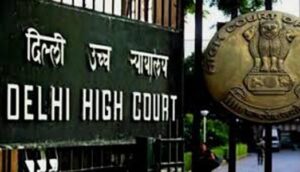NEW DELHI, JUNE 28
The Delhi High Court Monday refused to stay the new Information Technology rules which seek to regulate digital news media, saying it was not in agreement with the petitioners on passing such an order at this stage.

Foundation for Independent Journalism, The Wire, Quint Digital Media Ltd and Pravda Media Foundation, parent company of Alt News, sought a stay on the Information technology (Intermediary Guidelines and Digital Media Ethics Code) Rules, 2021, on the ground that a fresh notice has been issued to them to comply with the rules or else coercive action will be taken.
A vacation bench of Justices C Hari Shankar and Subramonium Prasad said the notice has been issued to them only for implementation of notification on which there was no stay.
“We are not in agreement with you. If you want we will pass a reasoned detailed order or if you want we can renotify it before the roster bench. You take instructions and let us know,” the bench said.
After taking instructions, senior advocate Nitya Ramakrishnan, representing the news portals, urged the court to list the matter on reopening of courts after vacations.
The court listed the applications for stay before the roster bench on July 7.
According to amended IT rules, social media and streaming companies will be required to take down contentious content quicker, appoint grievance redressal officers and assist in investigations.
Meanwhile, the court issued notice to the Centre and sought its response on a fresh petition by Pravda Media Foundation challenging the vires or legality of IT Rules.
The court asked the Ministry of Electronics and Information Technology and the Ministry of Information and Broadcasting to file reply to the petition within four weeks and listed it for hearing on August 4, the date already fixed for hearing similar pleas by Foundation for Independent Journalism, The Wire and Quint Digital Media Ltd.
The stay applications were filed in the pending main petitions challenging the vires of the IT Rules.
During the hearing on the stay applications, the bench said the matter came up for hearing three times before the roster bench and the petitioners could have moved the pleas for stay on the notification then.
“The matter came up on May 27 also. You had no interim relief then also. The action they (authorities) are now taking is only implementing rules. Now the notice issued to you is only for implementation of rules since there was no stay. We are not in agreement with you,” the bench said.
Ramakrishnan submitted that the application has been filed now as the June 18 letter issued by the authorities says consequences will follow and they are entitled to approach the court as they were being threatened with coercive action.
The high court had earlier issued notices and sought responses of the Centre on the Petitions by Foundation for Independent Journalism, The Wire and Quint Digital Media Ltd.
The bench had refused however to pass any interim order and said it will be considered at a later stage.
The petitioners’ counsel had urged the high court to grant them interim protection so that no coercive steps are taken against the digital news media outlets by the authorities.
The petition by Quint Digital Media Ltd and its director and co-founder Ritu Kapur has challenged the constitutional validity of the IT Rules under the provisions of Information Technology Act, 2000, inasmuch as they purport to apply to ”publishers of news and current affairs content’ as part of digital media, and consequently regulate these entities under the Rules by imposing government oversight and a ‘Code of Ethics’ which stipulates such vague conditions as ‘good taste’, ‘decency’ and prohibition of ‘half-truths’.
The petitioners said they bring out wholly digital news and current affairs publication called ‘The Quint’ and are directly impacted by the new IT Rules, which is also an overreach by subordinate legislation.
“The petitioners’ digital news portal publishes news and views, as distinct from curated content. The present petition challenges the IT Rules, 2021 only in so far as they affect digital news portals, and is not with reference to ‘publishers of online curated content’, that it, OTT media platforms or any other entities sought to be regulated by the impugned Rules,” the pleas said.
“Creating a differential classification by way of subordinate legislation, when not contemplated by the parent IT Act is an overreach by itself and this has been done to specifically target digital news portals, by subjecting them to an unprecedented regulatory burden and State interference, which no other form of news publication is subject to,” it said.
It claimed that this overreach is aggravated by a virtual legislation by reference, inasmuch as the Rules incorporate the Journalistic Norms under the Press Council Act, the Programme Code under the Cable TV Act, and vest draconian powers and control in the State.
The pleas sought striking down of the specific part of the IT Rules on the ground that it violates Article 19(1)(a) and 19(1)(g) of the Constitution creating a chilling effect on media freedom, Article 14 of the Constitution by creating an unreasonable classification and by setting up a parallel adjudicatory mechanism to be overseen by the officials of the executive and is ultra vires the IT Act.
The 2021 Rules regulate the functioning of online media portals and publishers, over-the-top (OTT) platforms and social media intermediaries.












